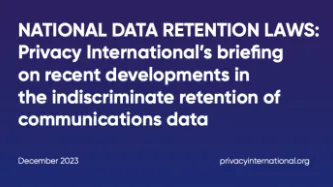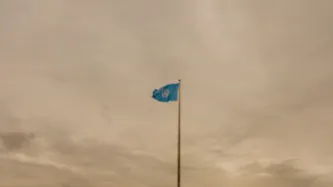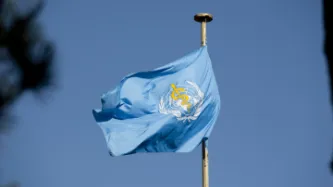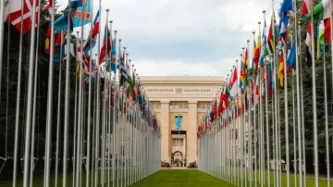Search
Content type: Long Read
1. What is the issue?Governments and international organisations are developing and accessing databases to pursue a range of vague and ever-expanding aims, from countering terrorism and investigating crimes to border management and migration control.These databases hold personal, including biometric, data of millions if not billions of people, and such data is processed by technologies, including Artificial Intelligence (AI), to surveil, profile, predict future behaviour, and ultimately make…
Content type: Report
First published in 2017, PI’s Guide to International Law and Surveillance is an attempt to collate relevant excerpts from these judgments and reports into a single principled guide that will be regularly updated. This is the fourth edition of the Guide. It has been updated it to reflect the most relevant legal developments until March 2024.The Guide aspires to be a handy reference tool for anyone engaging in campaigning, advocacy, and scholarly research, on these issues. The fourth…
Content type: Report
Over the past years, data retention regulation imposing generalised and indiscriminate data retention obligations to telecommunication companies and Internet service provides has been introduced in various jurisdictions across the world. As the data retention practices across the world have evolved this new report is an attempt to shed some light on the current state of affairs in data retention regulation across ten key jurisdictions. Privacy International has consulted with human…
Content type: Advocacy
In PI’s view the Revised Draft is a significant step back to the already weakened previous draft. Among the many concerns that we highlight in this analysis, we are particularly dismayed by the deletion of a principle on privacy, data protection and confidentiality in Article 3. In all previous drafts, the inclusion of such provision reflected the importance that data protection and privacy plays in any effective, modern public health policies. Failing to keep a specific principle on privacy…
Content type: Advocacy
Privacy International had suggested the Human Rights Committee consider the following recommendations for the UK government:Review and reform the IPA 2016 to ensure its compliance with Article 17 of the ICCPR, including by removing the powers of bulk surveillance;Abandon efforts to undermine the limited safeguards of the IPA 2016 through the proposed Investigatory Powers Amendment Bill;Refrain from taking any measures that undermine or limit the availability of encrypted communications or other…
Content type: Advocacy
BackgroundThe Snowden revelations and subsequent litigation have repeatedly identified unlawful state surveillance by UK agencies. In response, the UK Parliament passed the highly controversial Investigatory Powers Act 2016 (IPA), which authorised massive, suspicionless surveillance on a scale never seen before, with insufficient safeguards or independent oversight.Privacy International led legal challenges to this mass surveillance regime both before and after the Act became law. The Act…
Content type: Report
This policy paper seeks to determine the potential for the existing international private military and security companies (PMSC) regulatory framework to support more effective regulation of surveillance services provided by the private sector.In order to achieve this, and given that this paper addresses an issue that is at the intersection of two domains, it seeks to establish a common language and terminology between security sector governance and surveillance practitioners.In…
Content type: Advocacy
Privacy International welcomed the opportunity to provide input to the study of the UN Human Rights Council Advisory Committee on the human rights implications of new and emerging technologies in the military domain (NTMD) to be presented to the Human Rights Council at its sixtieth session.In the course of our work, we observe that the line between military and civilian technologies is blurring. Governments are increasingly relying on the very same technologies for military and civilian uses.…
Content type: Advocacy
Privacy International joined civil society efforts to call the South African Parliament not to approve the draft General Intelligence Laws Amendment Bill 2023 (GILAB), which was approved by the Cabinet and introduced in Parliament.
The Bill was proposed by the South African government, after the Constitutional Court found the Regulation of Interception of Communications Act of 2002 (RICA) unconstitutional on multiple grounds.
The draft Bill fails to meet the human rights standards on many…
Content type: Advocacy
Dejusticia, Fundación Karisma, and Privacy International submitted a joint stakeholder report on Colombia to the 44th session of the Universal Periodic Review at the UN Human Rights Council.Our submission raised concerns regarding the protection of the rights to freedom of expression and opinion, to privacy, and to personal data protection; the shutdown of civil society spaces; protection of the right to protest; and protection of the rights of the Venezuelan migrant and refugee population.…
Content type: Advocacy
We are responding to the UK Government's consultation to expand its powers around Technical Capabilities Notices and National Security Notices.
Background
Following Edward Snowden's revelations about the illegal and expansive secret powers of the US and UK intelligence agencies, the UK Government took the opportunity to, rather than reflect on what powers are proportionate in the modern era, to expand its arsenal of surveillance powers.
One of the powers it added was the ability to issue…
Content type: Advocacy
The submission provides PI’s information and analysis of some of the topics listed in the call. The widespread use of new technologies presents both opportunities and challenges for the protection of human rights, including the right to life and the right to privacy. PI believes that is essential that states take a human rights-centered approach in their use of these technologies, and ensure that their use is consistent with international human rights law. By doing so, states can ensure that…
Content type: Advocacy
Privacy International (PI) welcomes the zero draft of the WHO convention, agreement or other international instrument on pandemic prevention, preparedness and response (“WHO CA+”). PI has sought to closely follow and engage with the discussions leading up to the draft treaty, despite the significant limitations to civil society participation in the process.
PI believes that the zero draft offers a good basis for negotiations. In particular, we welcome the inclusion of a provision on…
Content type: Long Read
We won our case against the UK’s Security Service (MI5) and the Secretary of State for the Home Department (SSHD). The Investigatory Powers Tribunal (IPT) – the judicial body responsible for monitoring UK’s intelligence and security agencies – held that MI5 acted unlawfully by knowingly holding people’s personal data in systems that were in breach of core legal requirements. MI5 unlawfully retained huge amounts of personal data between 2014 and 2019. During that period, and as a result of these…
Content type: Press release
In a landmark judgment, handed down today (Monday 30 January 2023), the Investigatory Powers Tribunal have found that there were “very serious failings” at the highest levels of MI5 to comply with privacy safeguards from as early as 2014, and that successive Home Secretaries did not to enquire into or resolve these long-standing rule-breaking despite obvious red flags.Human rights organisations Liberty and Privacy International, who brought this significant legal case in January 2020, have…
Content type: Long Read
The rise of the gig-economy, a way of working relying on short term contracts and temporary jobs rather than on an employed workforce, has enabled the growth of a number of companies over the last few years. But without the rights that comes with full employment, gig economy workers today don't have access to essential protections.
In 2021, PI worked with ACDU and Worker Info Exchange to shed a light on the power imbalance between workers and gig economy platforms, exposing how workers find…
Content type: News & Analysis
We have been fighting for transparency and stronger regulation of the use of IMSI catchers by law enforcement in the UK since 2016. The UK police forces have been very secretive about the use of IMSI catchers – maintaining a strict “neither confirm nor deny” (NCND) policy. In our efforts to seek greater clarity we wrote to the UK body which monitors the use of covert investigatory powers, the Investigatory Powers Commissioner’s Office (IPCO), asking the Commissioner to revisit this…
Content type: Long Read
In the UK, successive government ministers and members of parliament have made emotive proclamations about the malaise of "public sector fraud".
This year, former Work and Pensions Secretary Therese Coffey said that the welfare system "is not a cash machine for callous criminals and it’s vital that the government ensures money is well spent...[and] fraud is an ever-present threat."
In 2013, the UK's minister for the disabled made numerous claims that there were "vast numbers of bogus disabled […
Content type: Advocacy
Privacy International (PI) notes the conceptual zero draft of the WHO’s Pandemic prevention, preparedness, and response accord (“WHO CAII”). PI has sought to closely follow and engage with the discussions leading up to the draft CAII, despite the significant limitations to civil society participation in the process. In September 2022 we submitted our observations to the working draft of the WHO CAII. This analysis builds upon those observations.
Broadly, PI welcomes the content of the…
Content type: Advocacy
Privacy International welcomes the opportunity to provide written input on the working draft of the WHO’s Pandemic prevention, preparedness, and response accord (“WHO CAII”) published on 13 July 2022.
This submission is based on our research and assessment of data-reliant and tech-intensive measures deployed by governments and companies in response to Covid-19 and its aftermath, which documented how these measures impacted people’s fundamental rights and freedoms, including the right to…
Content type: Report
End-to-end encryption (E2EE) contributes significantly to security and privacy. For that reason, PI has long been in favour of the deployment of robust E2EE.Encryption is a way of securing digital communications using mathematical algorithms that protect the content of a communication while in transmission or storage. It has become essential to our modern digital communications, from personal emails to bank transactions. End-to-end encryption is a form of encryption that is even more private.…
Content type: Long Read
Introduction
In response to the unprecedented social, economic, and public health threats posed by the Covid-19 pandemic, the World Bank financed at least 232 "Covid-19 Response" projects. The projects were implemented across countries the World Bank classifies as middle and low-income.
This article will focus on eight (8) Covid-19 Response projects which sought to deliver social assistance to individuals and families on a "non-contributory" basis (this means that the intended beneficiaries…
Content type: Advocacy
Today, PI filed a complaint with the Forensic Science Regulator (FSR) in relation to quality and accuracy issues in satellite-enabled Global Positioning System (GPS) tags used for Electronic Monitoring of subjects released from immigration detention (GPS tags). We are concerned there may be systemic failures in relation to the quality of data extracted from tags, processed and interpreted for use in investigations and criminal prosecutions.
The GPS tags are used by the Home Office to…
Content type: Advocacy
Despite repeated recommendations by the UN Human Rights Council and the UN General Assembly to review, amend or enact national laws to ensure respect and protection of the right to privacy, national laws are often inadequate and do not regulate, limit or prohibit surveillance powers of government agencies as well as data exploitative practices of companies.
Even when laws are in place, they are seldom enforced. In fact PI notes how it is often only following legal challenges in national or…
Content type: Report
Privacy International’s submissions for the Independent Chief Inspector of Borders and Immigration inspection of the Home Office Satellite Tracking Service Programme
The Home Office have introduced 24/7 electronic monitoring and collection of the location data of migrants via GPS ankle tags. This seismic change cannot be overstated. The use of GPS tags and intention to use location data, kept for six years after the tag is removed, in immigration decision-making goes far beyond the mere…
Content type: Explainer
Following sustained reporting by researchers, journalists and activists around the world, including recent disclosures exposed by the PegasusProject, the surveillance industry is facing scrutiny like never before.
In the latest move, eighteen U.S. lawmakers have today demanded that the U.S. government imposes sanctions on four non-US surveillance companies for, as they mention in their letter, facilitating “disappearance, torture and murder of human rights activists and journalists”.
The move…
Content type: Examples
The 20 years since the 9/11 attacks have fundamentally changed the way the New York Police Department operates, leading it to use facial recognition software, licence plate readers, and mobile X-ray vans, among other surveillance tools for both detecting and blocking potential terrorist attacks and solving minor crimes. Surveillance drones monitor mass protests, antiterrorism officers interrogate protesters, and the NYPD’s Intelligence Division uses antiterror tactics against gang violence and…
Content type: Examples
Clashes between police and lockdown protesters have spawned reports of police brutality in Greece. Mobile phone footage of one such protest in March 2021 suggested that the police are using drones to surveil the protests, and some of those remanded have complained that they’ve been beaten and subjected to threats and sexual harassment while in custody. Disinfaux Collective has identified an individual caught on video throwing a petrol bomb as “either a police officer of the DRASI unit… or,under…



























